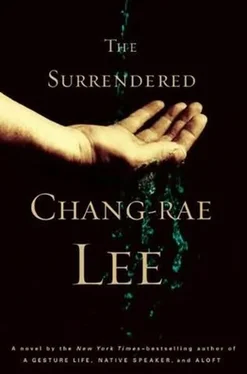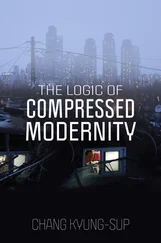“What happened to the head of the mission?” Reverend Lum asked.
“Please, Tom,” his wife said to him. “Sylvie’s parents don’t want her to hear about such things.”
“That’s all right, Betty,” her father said. “We don’t try to shield her from what goes on. Anyway, she’s old enough now. Aren’t you, sweetie?”
“Yes, I am.”
“Nobody was spared,” Harris said, looking away from Sylvie. “And they don’t use guns in the Congo. They don’t just shoot people. I’ll leave it at that, for everyone’s sake.”
“This isn’t Africa,” Mrs. Lum said.
“Oh no? I keep hearing about certain things up north. How the Japanese wiped a few villages off the map. Eradicated every last soul.”
“That’s a rumor they themselves spread to scare us,” she answered. “I heard it was just one remote village the Japanese wanted for a base, and that all the people agreed to be relocated and work in a boot factory near Harbin. So what’s the truth? What should we believe?”
“That this is effectively a war zone,” Harris replied. “Whether declared or not. Something is different now. What I see and hear is that there’s no protection here for anyone. Including foreigners.”
There was a moment of silence before Jane Binet spoke up. Sylvie caught a certain glimmer in her eyes and she could anticipate what her mother was going to say. “I think if you’re right, Tom, then we need to keep the mission and school open for as long as we can. I don’t know if that means coming to some agreement with a certain side or not. You and Francis and Reverend Lum must decide on that. But whatever it is, it has to allow us to stay on here until the very last possible hour. The last possible minute. Because all of us can imagine what it will be like for these children and their families when the war does come.”
“The problem is determining what that last minute is,” Tom Harris said, but not forcefully, for of course he knew it was pointless to argue. He and his wife had been stationed in the same place or area with Sylvie’s parents several times, and like all the other aid workers and missionaries who had worked with them, they came to understand that the Binets were not out in the forsaken regions of the world for the usual constellation of reasons, for the glory of God and Samaritanism, or as some mode of escape or adventure or self-trial. They were not ultimately sentimental people, being rarely ruled by their hearts, even as they were genuinely loving and caring to their charges. They were two people who over the years had honed themselves into ideal instruments of mercy, and like any such instruments the greatest sin was to be only half used.
“I see there are some moon cakes to be had,” her father said brightly, breaking the mood. They each got a quarter-cake, Sylvie eating hers in a single mouthful as the others slowly nibbled. Both her parents offered theirs to her but she refused, despite how its greasy sweetness made her insides leap. She was not some needy child. Li, the young Latin and math teacher, nudged her with his elbow and silently offered his to her but she refused him as well. A month ago she would not have taken it for the reason that others might sense how infatuated she was with him. But now she did not care anymore what the others might see. For she was infatuated, and had been practically from the moment he arrived. He had a lovely English accent and when he asked her during their private Latin lesson to translate a passage from the Gallic Wars , he would address her as Miss Binet , like some proper suitor in a novel. He was not much taller than she and although several years removed from university he could easily be mistaken for a high schooler, with his lithe, smooth-skinned build. He had the habit of adjusting his round silver-framed spectacles with both hands, delicately propping them higher on his unusually prominent nose. He pomaded his thick, coal-black hair with an English ointment that smelled of sweetened almonds, like marzipan. One day back in the late summer she had seen him shirtless when he helped her father bear large buckets of well water for the children’s baths, the wiry bands of his arms and shoulders and neck tensing with the effort. He had noticed her watching and waved to her and she had felt something drop from the top of her chest to the bottom. Now beneath the table he opened her hand and tucked the small wedge of cake into her palm but she could only feel the brief graze of his fingers on her knuckles and while they resumed talking she gently pressed the cake into a damp, doughy mass, focusing now on his gift to her and her chance to eat it. Only after the conversation turned again to how best to engage the Japanese and Chinese authorities was she excused from the table, and she walked across the frozen ground of the courtyard to the room she shared with her parents. In the unheated room she let her fingers curl open, uncupping the tiny lode of heat. She ate slowly this time, simply letting her mouth dissolve the cake rather than chewing or swallowing, running the tip of her tongue on the creases of her palm to get every last tinge of the lard.
The sweetness warmed her, despite the frigidity of the room. She unbuttoned her coat, unwound her scarf. In fact she felt overheated of late, when her parents and the others seemed to have developed a waxen rime from the unceasing bitter temperatures. Even Benjamin Li could seem to stiffen in his movements. Her changing body had become a perfectly efficient generator, somehow able to turn any meager morsel into a sustained heat. In the absence of fuel it ran anyway, heedless of her spells of dizziness and great thirst and a waving ache in her joints, in her bones. Worst of all was the abraded sensation, the feeling as if her insides were in perpetual friction, flaring and rebelling against her body. Every night now in her cot, on her side of the folding painted screen her parents had borrowed from the Lums for some privacy in their shared room, she’d cast aside the many layers of rough woolen blankets and pull up her nightgown to her throat and let the piercing air check her until every ember seemed finally to succumb and she was as ashen as the moonlight painted her. She shivered terribly in her nakedness and gripped the side bars of the cot until her hands grew numb, and one morning her mother told her while brushing her hair that one’s body was never wrong and though she’d said it before, just as cryptically, Sylvie finally understood what she meant. For hadn’t she let go, too, stunning herself to another state of waking with her frozen hands? As with everything else, she learned this, too, from her parents. For as long as her memory served she’d listened to them making love (their living quarters were necessarily humble and cramped wherever they went) and she’d peered through her arms at their caresses and then her mother’s willowy body shifting above her father, tapping out even before it happened the rhythmic tick of the bed frame and the beautiful breathing by which she would slumber.
Out in the courtyard she saw that Benjamin Li had stepped out to smoke. She waved to him through the window but the brightness of the sun in the clear skies must have obscured her and he didn’t notice her. She was glad that he didn’t; now she could watch him freely. He pulled a cigarette from his etched silver case and lightly tapped it three times, as he always did. None of the other adults smoked and he was somewhat bashful about it and always went outside even though no one would have objected, especially in this weather. He didn’t seem aware that he smoked with a rakish stance, his coat collar raised, shielding the match flame from the wind with his hands and narrowing his eyes as he inhaled. When they first started their Latin lessons when he arrived in the summer, he often blew rings for her, though the other day she had suddenly felt it was too childish and didn’t reach out and poke through them, instead letting them dissipate on their own. He’d seemed almost hurt, if only for a moment. His Chinese name was Ping-Wo but everyone called him Benjamin, the name he’d chosen for himself while studying in England, after Disraeli. Sylvie only recently began calling him by his given name, asking him a question with the address during one of their lessons. He’d paused before answering but said nothing and resumed without mention or pause the next times she said his name.
Читать дальше











